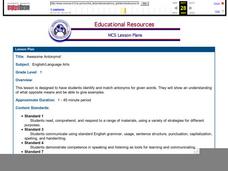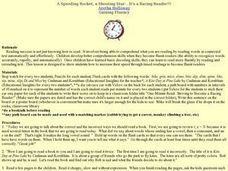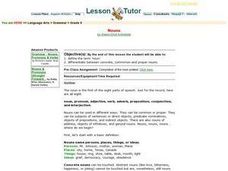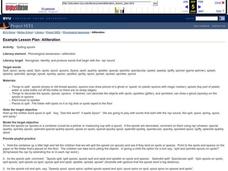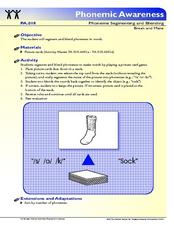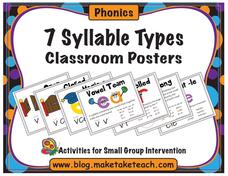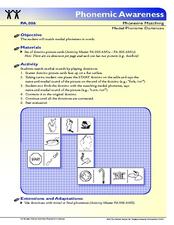Super Teacher Worksheets
Homophones
There, their, or they're? Wear or where? The 10 sentences on this homophone instructional activity asks kids to select the correct homophone from the provided word box.
Curated OER
Awesome Antonyms
Review with your young learners what opposites are and use a fun tag board game called Auntie Alice to practice. After the class plays the game, pairs work on computers practicing with interactive matching/flashcards/concentration games...
Curated OER
Constructing Contractions
Young writers participate in a game to practice making contractions and using the apostrophe properly.
Curated OER
Spelling Relay
Looking for a way to review and practice spelling words that's fun and creative? Use this spelling relay activity for any grade level. Using three spelling lists, ranging in difficulty, teams of young spellers choose words from the lists...
Curated OER
Letter Chains: Spelling Knowledge
Your class will love this spelling activity. Learners create words based on a particular pattern. It is a great way to have them practice spelling patterns and identifying rhyming words. This technique could be used with a variety of...
Curated OER
What's the Weather Like? Primary Level
Elementary schoolers and language learners will shine with a series of games and activities that feature weather words. The exercises can be adapted for pairs, small groups, or whole class participation.
Curated OER
Reading Olympics
Celebrate the joy of reading with activities that center on having fun with books. The teacher creates a variety of "Reading Olympics" categories for the class to compete in, including who can find the longest word, or create the longest...
Curated OER
A Speeding Rocket, a Shooting Star... It's a Racing Reader!
Prepare a gameboard and die-cut race cars to play a fun fluency game. Also create several flash cards to review the long /i/ sound. Then, model reading smoothly and with expression, emphasizing the importance of re-reading...
Savvas Learning
Nouns
Singular and plural. Count and noncount. Nouns are the focus of this 19-page grammar packet. Language learners complete a series of exercises ranging from fill-in-the-blank questions to word puzzles and more in order to further...
ESL Kid Stuff
Past Tense Activities - Irregular Verbs
"What did you do yesterday?" Language learners engage in carefully scaffolded activities that review past tense regular verbs, that introduce new vocabulary words, and that permit practice of using the past tense of...
Florida Center for Reading Research
Phonological Awareness: Phoneme Matching, Medial Match
Early readers get together and match medial phonemes. They take turns picking picture cards from a pile; they say each word, then determine whether the pair has matching medial sounds.
Curated OER
My Family- Long I or Long E Sounds of Letter Y
Provide this awesome word packet to your young learners! Long vowel sounds are covered through coloring activities, writing activities, and matching activities. The long i and e sounds of the letter y are covered, and several word...
Curated OER
Alliteration
Students recognize, identify and produce words that begin with the /sp/ sound. They decorate objects that have the /sp/ sound with items that have the /sp/ sound. Students create phrases with the /sp/ sound that describe the object...
Curated OER
ABC Grammar Book
Elementary learners create an ABC grammar book. The project begins with class members taking digital pictures of items that begin with each letter of the alphabet. Depending on level, they then add a word or a complete sentence to...
Florida Center for Reading Research
Phonological Awareness: Phoneme Matching, Final Phoneme Memory
Try to match the final sounds in this memory game! Learners place all 24 cards upside down and take turns flipping them to see if the final phonemes match. If they do, remove them; if not, put them back. Partners play until all cards...
Curated OER
Hanukkah - ESL
Reinforce vocabulary and reading comprehension with a Hanukkah-themed collection of worksheets. Scholars first read a two-paragraph informational text, then apply their new-found-knowledge to match phrases, fill in blanks with...
Florida Center for Reading Research
Phonemic Awareness: Phoneme Segmenting and Blending, Break and Make
Young learners build phonemic awareness and strong phoneme blending skills. Pairs guess the image on the card based on the word segment sounds given by blending what they hear.
Make Take Teach
7 Syllable Types - Classroom Posters
Review r-controlled words, open and closed vowels, and dipthongs with a set of classroom posters. Each page features one concept with a colorful illustration, an explanation, and a list of applicable words.
Savvas Learning
Comparatives and Superlatives
If not the best, then certainly one of the better grammar resources designed for language learners, this packet focuses on comparatives and superlatives.
Curated OER
What's Proper?
Learners practice using capital letters for proper nouns and adjectives. They play a matching game with word cards and correct paragraphs with incorrect capitalization, and edit their work with a partner.
Florida Center for Reading Research
Phonological Awareness: Phoneme Matching, Medial Phoneme Dominoes
Matching medial phonemes can be as easy as playing a game of dominoes! These dominoes contain pictures of items children can say. As they say each word aloud, they work to match the medial sound to one on an adjacent card. Just like real...
Curated OER
Name It! - Nouns
Young readers practice identifying nouns. This interactive resource goes over the the three categories that nouns fit into, then has them click on the words they think are nouns in sentences contained in each slide. If they get it right,...
Curated OER
Say and Spell Vowel Digraph Board Game
Students say and spell vowel digraphs by playing a board game. In this vowel digraphs lesson plan, students make a single sound with 2 vowels.
Curated OER
Tic Tac Toe: Rhyming Words
In this rhyming words instructional activity, students play three tic-tac-toe games in which rhyming words in a row are marked. Students then change the letter with a circle around it in four words to spell a new word.

